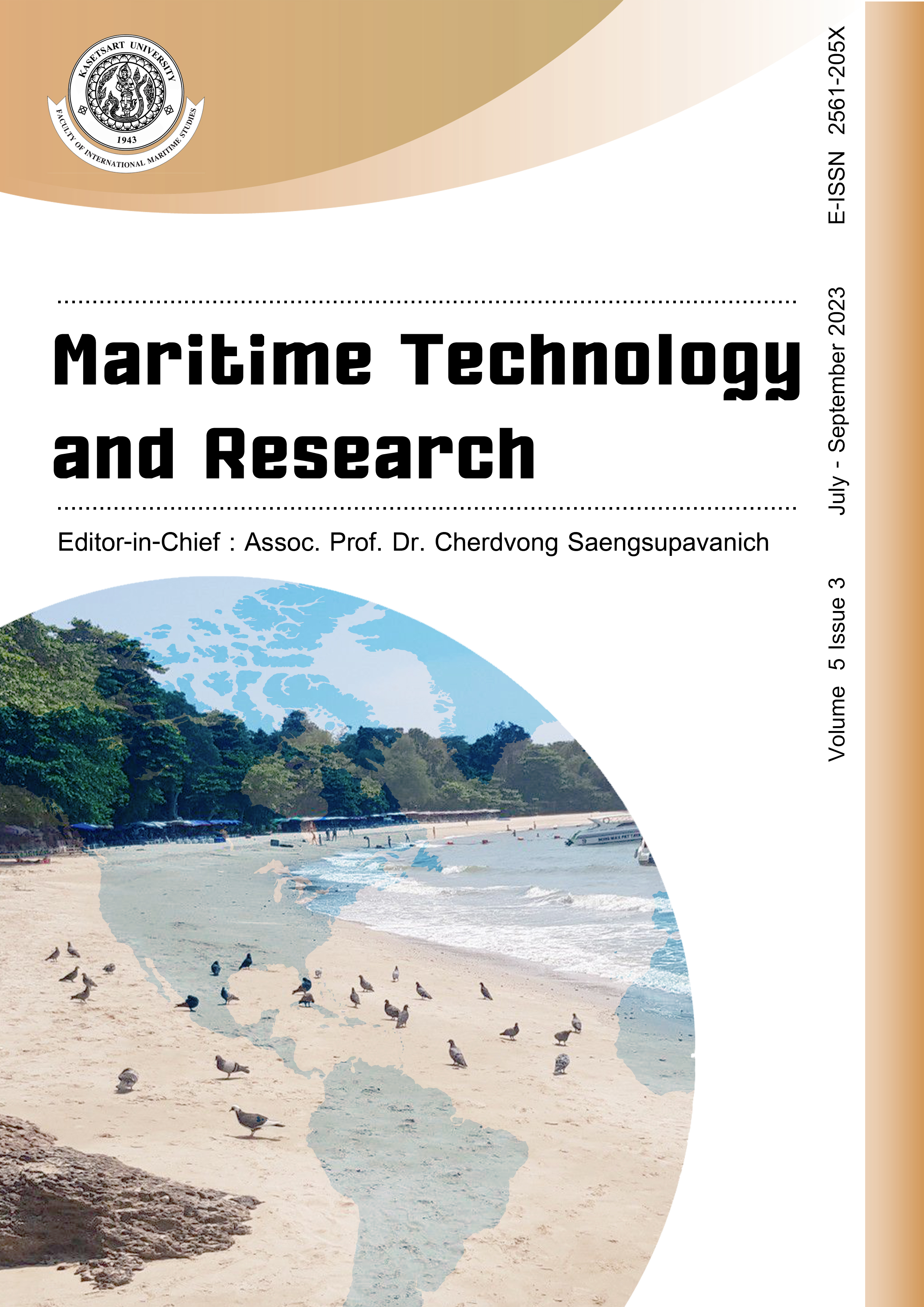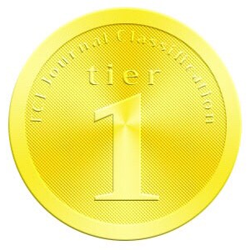Modeling and analysis of the voyage cycle for ferryboat electrification
DOI:
https://doi.org/10.33175/mtr.2023.261999Keywords:
Simulink, Voyage cycle, Passenger ferry, Ferry electrification, Electric boatAbstract
Voyage cycle modeling provides an estimation of the battery energy requirements in preparation for the electrification of passenger ships. In this study, the objectives are to model the voyage cycle of a public transportation ferry and to determine the appropriate battery storage capacity in preparation for ferry electrification. Pasig River Ferry Service (PRFS), located in Metro Manila, Philippines, was used to model a voyage cycle for ferryboat electrification. Speed and route characteristic data were gathered during the operations of the ferry through a surveyor equipped with a GPS logger. The voyage characteristics gathered, ferry specifications, and diesel engine look-up table were used as inputs to develop a Simulink model that provides the estimated fuel consumption and the equivalent power consumption of the ferry in the case of electrification. The fuel consumption estimate was validated by comparing it to the fuel consumed during actual operation. Based on initial results, the fuel consumption estimates have percentage errors that vary from 2.25 to 12.94 % compared to the actual recorded fuel consumption during operations. The instantaneous power consumption from the voyage cycle Simulink model was used as an input to battery discharge simulations to evaluate the target battery design of the equivalent electric ferry system. Using the methodology of this study, the battery configuration and capacity were determined and evaluated for a single roundtrip voyage of the passenger boat.
------------------------------------------------------------------------------
Cite this article:
APA Style:
Cipriano, B.J., Cruzate, R.J., Diokno, S., Samonte, F., de Luna, L.J., Tria, L.A., Vergel, K., Rodgers, P., Odulio, C.M., & Abaya, E. (2023). Modeling and analysis of the voyage cycle for ferryboat electrification. Maritime Technology and Research, 5(3), 261999. https://doi.org/10.33175/mtr.2023.261999
MDPI Style:
Cipriano, B.J.; Cruzate, R.J.; Diokno, S.; Samonte, F.; de Luna, L.J.; Tria, L.A.; Vergel, K.; Rodgers, P.; Odulio, C.M.; Abaya, E. Modeling and analysis of the voyage cycle for ferryboat electrification. Marit. Technol. Res. 2023, 5(3), 261999. https://doi.org/10.33175/mtr.2023.261999
Vancouver Style:
Cipriano BJ, Cruzate RJ, Diokno S, Samonte F, de Luna LJ, Tria LA, Vergel K, Rodgers P, Odulio CM, Abaya E. (2023). Modeling and analysis of the voyage cycle for ferryboat electrification. Marit. Technol. Res. 5(3), 261999. https://doi.org/10.33175/mtr.2023.261999
------------------------------------------------------------------------------
Highlights
- Voyage Cycle modeling can provide an overview of the performance of a ferry
- Fuel and energy consumption can be estimated from the voyage cycle
- Battery discharge simulation is a method used to verify the battery system design
- Voyage Cycle Modeling is an initial step for existing boat operators in determining the energy requirements prior to electrification
References
Chaal, M. (2018). Ship operational performance modelling for voyage cycle optimization through fuel consumption minimization. Malmo, Sweden: World Maritime University.
Cruz, F. R., Garcia, B. W., Gania, R. C., Nob, J. C., & Bongon, M. (2021). Solar-assisted electric boat power and propulsion system simulations (pp. 1-5). In Proceedings of the IEEE 13th International Conference on Humanoid, Nanotechnology, Information Technology, Communication and Control, Environment, and Management, Manila, Philippines. https://doi.org/10.1109/HNICEM54116.2021.9732023
Estimates of Water Flow. (2022). Estimates of water flow. Retrieved from https://www.fao.org/fishery/docs/CDrom/FAO_Training/FAO_Training/General/x6705e/x6705e03.htm
Hashemnia, N., & Asaei, B. (2008). Comparative study of using different electric motors in the electric vehicles. In Proceedings of the 18th International Conference on Electrical Machines, Vilamoura, Portugal. https://doi.org/10.1109/ICELMACH.2008.4800157
Heaslip, E. (2022). A guide to voyage planning. Sofar Ocean. Retrieved from https://www.sofarocean.com/posts/a-guide-to-voyage-planning
Hein, K., Xu, Y., Wilson, G., & Gupta, A. (2021). Coordinated optimal voyage planning and energy management of all-electric ship with hybrid energy storage system. IEEE Transactions on Power Systems, 36, 2355-2365. https://doi.org/10.1109/TPWRS.2020.3029331
International Maritime Organization. (2018). UN body adopts climate change strategy for shipping. Retrieved from https://www.imo.org/en/MediaCentre/PressBriefings/Pages/ 06GHGinitialstrategy.aspx
Mauro, F., Monaca, U. I., Monaca, S. I., Marino, A., & Bucci, V. (2020). Hybrid-electric propulsion for the retrofit of a slow-tourism passenger ship (pp. 419-424). In Proceedings of the 2020 International Symposium on Power Electronics, Electric Drives, Automation and Motion, Sorrento, Italy. https://doi.org/10.1109/SPEEDAM48782.2020.9161920
Moussodji, J., & Bernardinis, A. D. (2015). Electric hybridization of a bow thruster for river boat application (pp. 1-6). In Proceedings of the IEEE Transportation Electrification Conference and Expo, MI, USA. https://doi.org/10.1109/ITEC.2015.7165811
Norton, A. (2016). Revie: Yanmar 4lha-Stp marine diesel engine. Retrieved from https://www.tradeaboat.co.nz/reviews/1603/yanmar-4lha-stp
UK Research and Innovation. (2021). Shipping industry reduces carbon emissions with space technology. Retrieved from https://www.ukri.org/news/shipping-industry-reduces-carbon-emissions-with-space-technology
Wingrove, M. (2019). How voyage simulation influences ship propulsion design. Rivera Maritime Media.
Downloads
Published
Issue
Section
License
Copyright (c) 2023 Maritime Technology and Research

This work is licensed under a Creative Commons Attribution-NonCommercial-NoDerivatives 4.0 International License.
Copyright: CC BY-NC-ND 4.0








